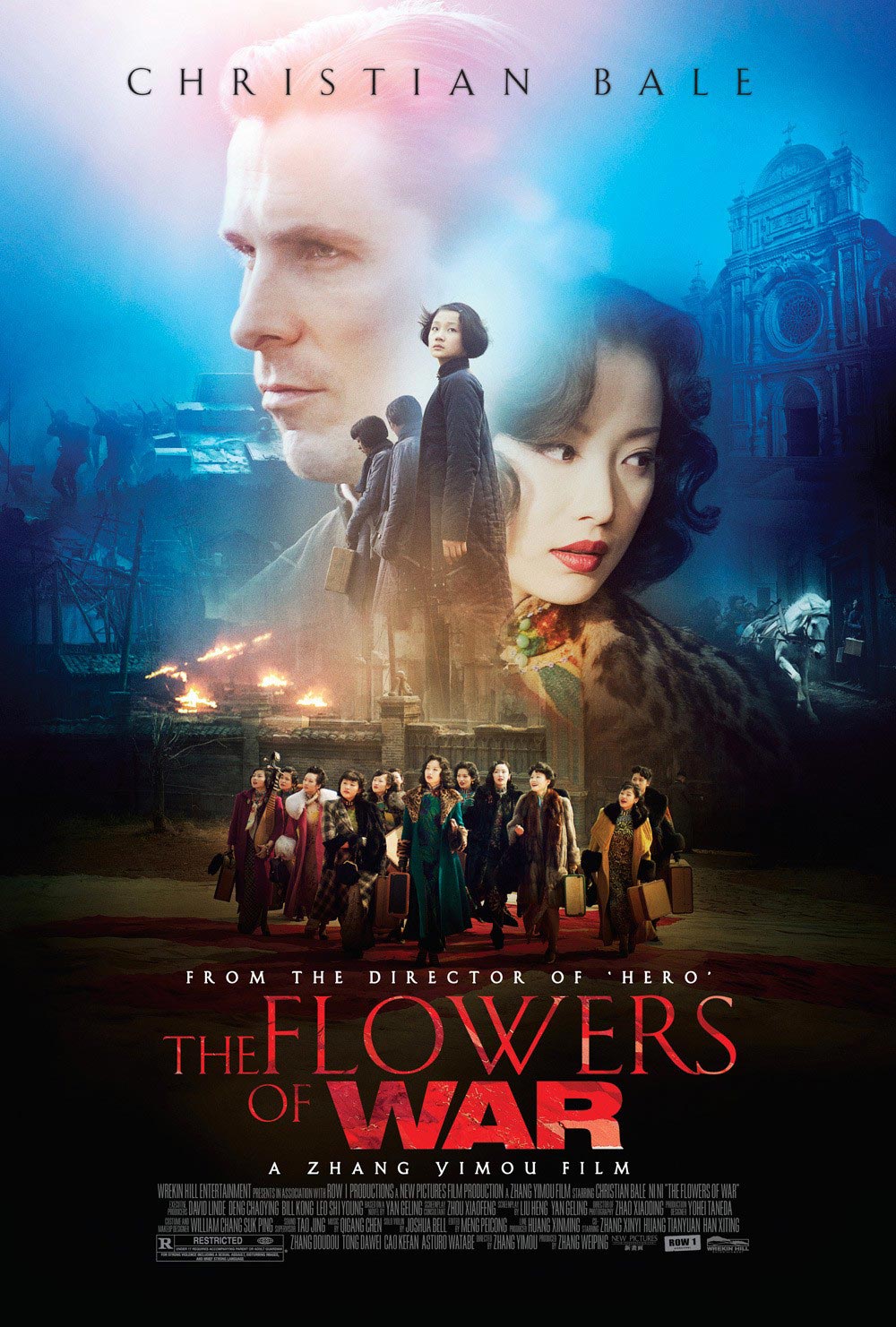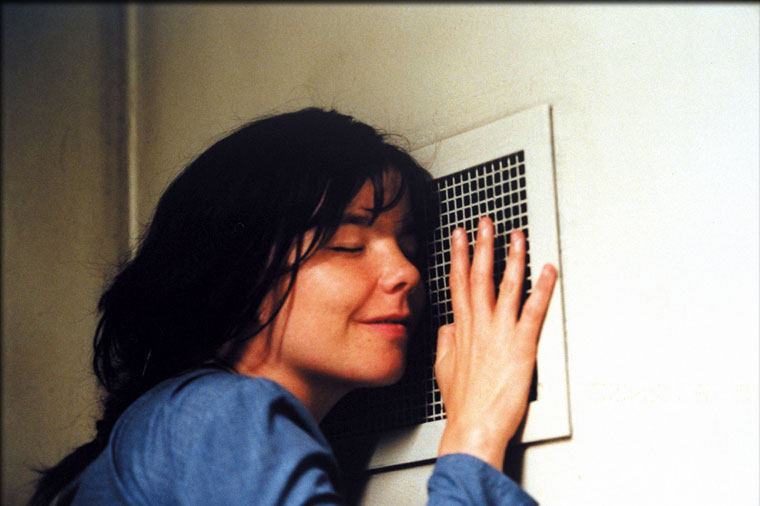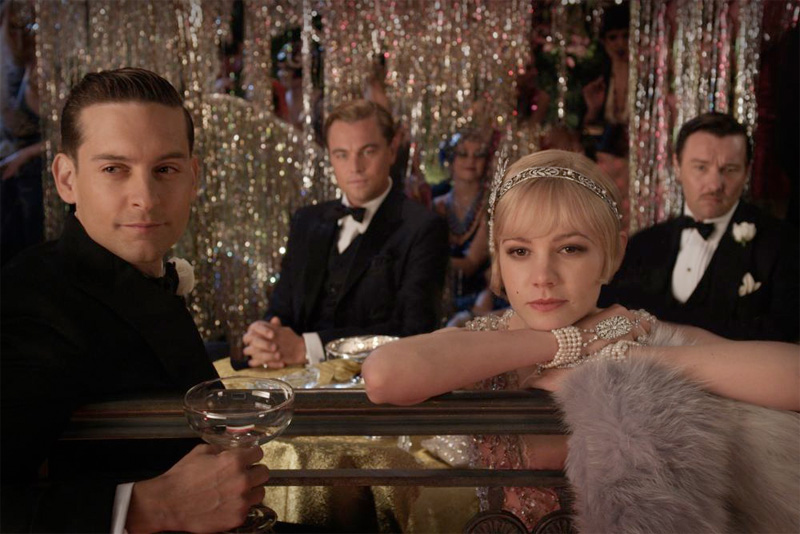Based on the novel (and true events) 13 Flowers of Nanjing by Geling Yang
Director: Zhang Yimou. Stars: Christian
Bale, Ni Ni, Xinyi Zhang
Released: December 2011
The Flowers
of War is
about a Westerner named John Miller (Bale), a mortician in China during the
Japanese attack on Nanjing in 1937, also known as the “The Rape of Nanjing.” He
finds refuge in a church with a group of women, half convent girls and the
other half prostitutes form Nanjing’s red light district, who had a deal with
the cook at the church to hide if need be, but the cook has fled. John poses as
a priest in his attempt to lead the woman to safety as the events of war unfold.
The inevitable occurs. He falls in love with Yu Mo, one of the ladies from the
red light district. I warn you now. This is not a love story. It is a story of war
and survival.
Directed by Zhang Yimou, who in North
America is known more for his intense action films, such as Hero and House of
Flying Daggers, and more notably, the opening ceremonies of the 2008 Beijing
Olympics. Not many know that he started
filmmaking in the late 1980’s and his early films were controversial and even
banned in China for some time. He is known for his beautiful use of colour, and
images that come from his head and come alive with the cinematography, as well
as his intricate use of large crowds in action sequences.
My first worry when this movie started was that
it was going to be another Orietalist depiction of a Westerner coming to the
East and imposing his way and being a savior to “lesser” people, who apparently
can't help themselves. Although there is a little bit of this element, the
fact that John is an American and is posing as a priest gives him and the women
in the church with him some protection from the Japanese. It is a fragile protection and in the end I
was pleased that this was more about a group of people coming together in order
to survive.
Christian Bale gives another solid
performance as John Miller, a mortician who for whatever reason is in China and
arrives to bury the Church’s actual priest. At times he is a smidge over the
top for my liking, but I think that is more Bale’s natural mannerisms, and at
times beautifully subtle. He is the typical anti-hero, a heavy drinker (to cope
with the war and forget past demons most likely) and only cares about his own financial
gain. He is selfish and unlikable at first, but, once he realizes that the
girls and women are better with him than without him, he continues to pose as a
priest. He is unsure exactly what to do
and how to get them all out of Nanjing, but under shaky ground and friendships he
works with all ladies. Of course by the
end, as we learn more about John, we begin to care about him and cheer him on.
His female counterpart, Yu Mo, played by Ni
Ni, also does a good job and holds her own against Bale. She is the beautiful, street
savvy prostitute, with a heart of gold and her own painful past. As I
mentioned, the love story is one element of the overall plot, but their banter
and developing relationship, and sad conclusion, still grab your heartstrings,
despite seeing this type of relationship before.
The group of innocent convent girls, juxtaposed
with the group of prostitutes hiding in the cellar, works as a metaphor of
innocence lost in the past, and the innocence threatened to be lost during the
present war. The teenage girls don’t like the ladies at first, believing they
are sinful and dirty, yet they don’t fully understand what these ladies do in
the known red light district. The ladies in turn, are reminded of who they use
to be before circumstances forced them into a life of selling themselves. This is probably highlighted best in a scene
when the ladies undergo a transformation into disguises to look like the
convent girls, in order to replace them going to a party with the Japanese Army.
They know what will happen with a group of thirteen teenage virgins in a room
full of Japanese male solders. As the women transform back into teenage girls,
the teenage girls look on to the developed female bodies and get a glimpse of
what they will become. This is a touching scene that leads to the climax of the
film.
The film doesn’t hold back in its harsh and
grim portrayal of violence of war and certain scenes may feel long and intense because
of this .There are violent deaths, including violence against women and girls, and
a brief gang rape scene, so this not for the faint of heart. This
film is also over two hours long, a few moments I did feel it dragged a little,
but I don’t mind long films.
One thing that always amazes me in Yimou’s films
and this is no different. Is how he manages to film such horrific and sad scenes,
while at the same time there is a beauty to the visuals we are looking at. It
is not an easy thing to have that balance, but this seems to be a talent of Yimou’s.
All to a beautiful musical score as
well.
The slow pace and violence may not be for
everyone, but the story of an unlikely group of people working together and
strong performances and characters we end up caring about, carry this movie. After
all, this is a war film, and in times of war we are shown the best and worst
that humanity is capable of.
I also have to give a shout out to one of
my former professors and a personal inspiration, Dr. Lisa Funnell. She not only was one of my biggest
cheerleaders, who gave lots of advice and worked me hard. She also introduced
me to the films of Zhang Yiumu, his early films in China before his North
American blockbusters. May your new
university and students appreciate you as much as I did.



















